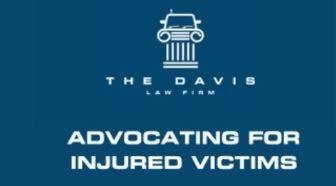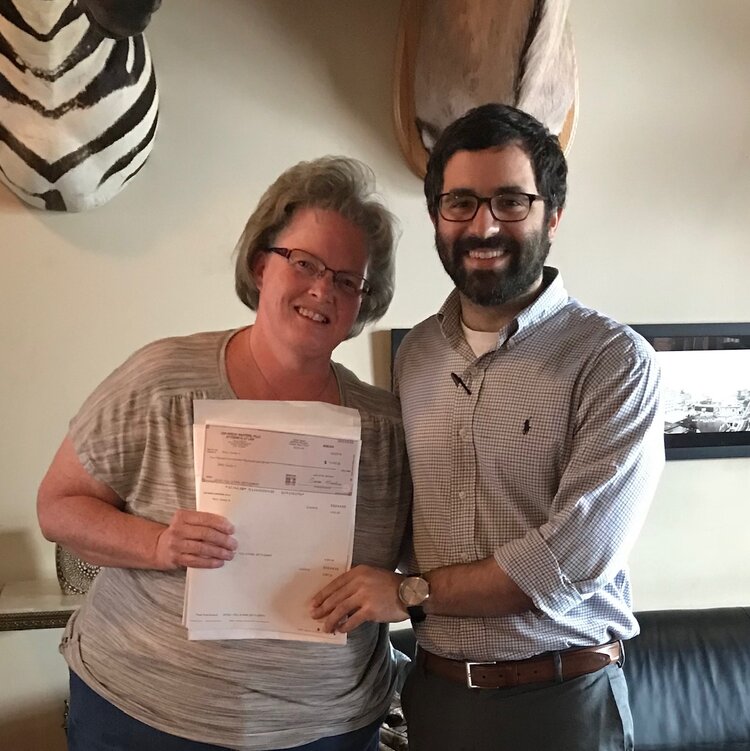- (972) 426-8388
- chad@chaddavislaw.com
- Mon - Saturday 8am to 8pm
Slip Trip and Falls
We provide a personal injury law service for Slip, Trip and Fall victims in the state of Texas.


WHAT WE DO
The Davis Law Firm: Your Trusted Advocates in Texas Personal Injury Law for Slip, Trip and Falls
Providing Personal Injury Law Service for over a Decade.
We have helped Texas residence settle their claims effectively and efficiently, taking the time to listen. We aim to settle your claim above and beyond your expectations.
WHY CHOOSE US
Why Choose Chad Davis
I will make sure you are satisfied throughout the entire process.
For professional service from a local Dallas resident personal injury attorney, contact me now for a no obligation confidential consultation.
Suffered a Slip, Trip or Fall Injury?
A dangerous condition on a premises can cause serious injuries to an unaware person. If someone slips or trips and falls, the ground is usually a very painful place to land. If a negligent premises owner or manager causes injury to someone on their property, it is their responsibility to compensate their victims and Chad can get the compensation these victims deserve.
Welcome to The Chad Davis Law Firm, your trusted ally in navigating the complexities of personal injury law, particularly in cases related to Slip, Trip, and Falls in the great state of Texas. Accidents can happen anywhere, but when negligence leads to injuries, our dedicated team of personal injury attorneys is here to provide expert legal representation tailored to the unique nuances of Texas law.
Why Choose The Chad Davis Law Firm for Slip, Trip, and Fall Cases in Texas?
Profound Knowledge of Texas Premises Liability Laws
At The Chad Davis Law Firm, we possess a deep understanding of Texas premises liability laws, crucial for building robust cases in slip, trip, and fall incidents. Our expertise allows us to navigate the legal landscape with confidence, ensuring you receive the compensation you deserve.
Thorough Investigation for Stronger Cases:
A successful personal injury claim demands a comprehensive investigation. Our team, equipped with resources and experience, meticulously gathers evidence, interviews witnesses, and examines the circumstances surrounding your slip, trip, and fall, establishing liability for a stronger case.
Navigating Comparative Fault in Texas:
Texas follows a modified comparative fault system, which can impact compensation based on the injured party’s degree of fault. The Chad Davis Law Firm excels in navigating these laws, strategically advocating for maximum compensation even when shared responsibility is a factor.
Exposing Negligence:
Whether it’s a slippery surface, uneven flooring, or inadequate warnings, our attorneys specialize in exposing negligence that led to your slip, trip, and fall. We hold property owners accountable for maintaining safe premises and seek justice for our clients.
Proactive Communication and Client Support:
Throughout the legal process, The Chad Davis Law Firm maintains open and transparent communication. We understand the physical, emotional, and financial toll these incidents can take, and our team is dedicated to providing guidance, answering your questions, and keeping you informed every step of the way.
Common Injuries in Slip, Trip, and Fall Incidents
Fractures and Broken Bones
The impact of a fall can lead to fractures and broken bones, requiring extensive medical attention and recovery.
Sprains and Strains
Twists and impacts during a fall may result in sprains, strains, and soft tissue injuries, causing pain and discomfort.
Head and Back Injuries
Slip, trip, and fall incidents can lead to serious head injuries, concussions, and back injuries with long-term consequences.
Psychological Impact
Beyond physical injuries, the psychological impact of a fall can be significant. Our legal approach takes into account the full extent of your suffering when pursuing compensation.
If you or a loved one has experienced a slip, trip, and fall incident in Texas, trust The Chad Davis Law Firm to be your advocate. Contact us today for a free consultation, and let our experienced team fight for your rights and the compensation you deserve.
The Davis Law Firm takes into account the full extent of your suffering when pursuing compensation.
Contact Chad Davis at The Davis Law Firm Today.
If you or a loved one has been involved in a slip, trip or fall in Texas, don’t navigate the legal aftermath alone. Contact The Davis Law Firm for dedicated and experienced personal injury representation. Our team is committed to fighting for your rights and securing the compensation you deserve. Schedule a free consultation today to discuss your case and explore your legal options.
TESTIMONIALS
See What People are Saying about our Services
At The Davis Law Firm we are so grateful for the kind reviews left for us, about the personal injury law clients we have had the pleasure of helping settle their claims.,
Amazing! Chad was great with communication, listened to everything I said, and he went above and beyond from what I thought I would settle with!
Keiandrea
5/5
Great communicator did a great job with my case kept in constant contact, put your mind to rest because Chad Davis is the best.
Anthony
5/5
We received what we asked for and a little more. Appreciate the service. Everyone was informative. And kept us up to date with everything going on.
Anonymous
5/5
Chad Davis was very. professional. Got me just right and right on time . I’m very satisfied. Thank you Mr. Chad Davis.
Deboarah
5/5

HAVE A DOUBT
Frequently Asked Questions
What does a personal injury lawyer do?
A personal injury lawyer is an attorney who specializes in providing legal representation to individuals who have been physically or psychologically injured as a result of the negligence or wrongdoing of another party. The goal of a personal injury lawyer is to help their clients receive compensation for the losses and damages they have suffered due to the accident or incident.
Here are some common tasks and responsibilities of a personal injury lawyer:
1. **Legal Consultation:** Personal injury lawyers often offer free initial consultations to assess the merits of a potential case. During this consultation, they gather information about the incident, injuries, and potential legal claims.
2. **Investigation:** Lawyers investigate the circumstances surrounding the injury, collecting evidence such as medical records, accident reports, witness statements, and other relevant documentation to build a strong case.
3. **Legal Research:** Personal injury lawyers stay informed about relevant laws, statutes, and legal precedents to effectively represent their clients and build persuasive arguments.
4. **Case Valuation:** They assess the value of the client’s claim by considering factors such as medical expenses, lost wages, property damage, pain and suffering, and other damages.
5. **Negotiation:** Personal injury lawyers often engage in negotiations with insurance companies or the opposing party to reach a fair settlement. This may involve back-and-forth discussions to agree on a compensation amount without going to court.
6. **Litigation:** If a settlement cannot be reached, the lawyer may file a lawsuit on behalf of their client. This involves drafting legal documents, conducting discovery, and representing the client in court.
7. **Advocacy in Court:** Personal injury lawyers present their client’s case in court, arguing legal points, examining witnesses, and presenting evidence to support their claims. They aim to convince a judge or jury of the defendant’s liability and the appropriate compensation for the injured party.
8. **Settlement Agreements:** In cases where a settlement is reached, the lawyer helps negotiate and finalize the terms of the settlement agreement, ensuring that the client receives the agreed-upon compensation.
9. **Client Advocacy:** Throughout the process, personal injury lawyers advocate for their clients’ rights, keeping them informed, providing legal advice, and working to achieve the best possible outcome.
Personal injury cases can involve various accidents, such as car accidents, slip and falls, medical malpractice, product liability, and more. The specific duties of a personal injury lawyer may vary depending on the nature of the case and the legal jurisdiction in which they practice.
How long does it take to settle a personal injury case?
The time it takes to settle a personal injury case can vary widely and depends on several factors. There is no fixed timeline, as each case is unique, and various elements can influence the duration of the process. Some of the key factors include:
1. **Extent of Injuries:** Cases involving severe injuries or long-term consequences may take longer to settle, as the full extent of the damages needs to be assessed. This may involve ongoing medical treatment, rehabilitation, and evaluations by medical experts.
2. **Liability and Dispute:** If there is a clear and straightforward determination of liability (who is at fault), the case may progress more quickly. However, disputes over liability or disagreements on the amount of compensation can prolong the process.
3. **Insurance Company Cooperation:** The responsiveness and cooperation of the insurance companies involved can impact the timeline. Delays may occur if there are difficulties in communication or if the insurance company is not willing to negotiate a fair settlement.
4. **Legal Proceedings:** If negotiations fail and the case goes to court, the litigation process can significantly extend the timeline. Court schedules, discovery, pre-trial motions, and other legal procedures contribute to a longer resolution time.
5. **Jurisdictional Differences:** The legal procedures and timelines can vary based on the jurisdiction in which the case is filed. Different states and countries have distinct legal systems and rules that can affect how quickly a case moves through the courts.
6. **Complexity of the Case:** Cases involving multiple parties, complex legal issues, or intricate details may take longer to resolve. Sorting through intricate details, gathering evidence, and addressing legal complexities can extend the settlement process.
7. **Negotiation Dynamics:** The negotiation process with the opposing party or insurance company can impact the timeline. If both parties are willing to negotiate in good faith and reach a settlement, the process may move more efficiently.
8. **Statute of Limitations:** The statute of limitations, which sets a time limit for filing a lawsuit, varies by jurisdiction and can impact the overall timeline. Missing the deadline could result in the inability to pursue the case.
In general, some personal injury cases may be resolved in a matter of months through negotiation, while others may take a year or more, especially if litigation is involved. It’s essential to consult with a personal injury lawyer to get a more accurate estimate based on the specific details of your case.
Can I file a personal injury claim without a lawyer?
Yes, it is possible to file a personal injury claim without hiring a lawyer, and some individuals choose to do so, especially for smaller claims. This is known as representing yourself “pro se.” However, there are several factors to consider before deciding to handle a personal injury claim on your own:
1. **Complexity of the Case:** If your case is relatively straightforward, involves minor injuries, and liability is clear, you might be able to navigate the process without legal representation. However, complex cases, severe injuries, or disputes over liability may benefit from the expertise of a personal injury lawyer.
2. **Legal Knowledge:** Personal injury law can be complex, and understanding the legal principles, rules, and procedures is crucial. If you’re not familiar with the law, you may find it challenging to navigate the process effectively and protect your rights.
3. **Insurance Company Tactics:** Insurance companies have experienced adjusters and legal teams whose goal is to minimize payouts. Without legal representation, you might be at a disadvantage when negotiating with these professionals.
4. **Evidence and Documentation:** Gathering and presenting evidence to support your claim is a critical aspect of a personal injury case. A lawyer can help ensure that you have the necessary documentation and build a strong case on your behalf.
5. **Negotiation Skills:** Negotiating a fair settlement requires skill and experience. Lawyers are trained in negotiation and can often secure better compensation for their clients than individuals representing themselves.
6. **Court Procedures:** If the case progresses to litigation, navigating court procedures, filing legal documents, presenting evidence, and arguing your case in court can be complex and challenging without legal representation.
7. **Statute of Limitations:** Missing deadlines or filing incorrect paperwork can jeopardize your case. A lawyer can help ensure that you comply with the statute of limitations and other legal requirements.
While it is possible to handle a personal injury claim without a lawyer, it’s essential to carefully evaluate your specific situation and consider consulting with an attorney. Many personal injury lawyers offer free initial consultations, allowing you to discuss your case and receive advice on whether legal representation is necessary. Keep in mind that, in many cases, personal injury attorneys work on a contingency fee basis, meaning they only receive payment if they successfully recover compensation for you.
How do I choose a Personal Injury Lawyer?
Choosing the right personal injury lawyer is crucial to the success of your case. Here are some key steps and considerations to help you select the right attorney for your needs:
1. **Experience:** Look for a lawyer with significant experience in personal injury law. An attorney who has handled cases similar to yours is more likely to understand the complexities of the legal process and have the expertise to navigate your specific situation.
2. **Specialization:** Choose a lawyer who specializes in personal injury law. This specialization indicates a focus on the relevant legal principles and a deeper understanding of the issues commonly associated with personal injury cases.
3. **Reputation:** Research the lawyer’s reputation by reading online reviews, testimonials, and asking for references. A positive reputation can provide insights into the lawyer’s track record of success and the satisfaction of previous clients.
4. **Credentials:** Verify the lawyer’s credentials, including their education, professional memberships, and any accolades or awards they may have received in the field of personal injury law.
5. **Track Record:** Inquire about the lawyer’s success rate and track record in handling personal injury cases. A lawyer with a history of obtaining favorable settlements or verdicts may be better equipped to handle your case effectively.
6. **Communication Skills:** Effective communication is crucial throughout the legal process. Choose a lawyer who communicates clearly, keeps you informed about the progress of your case, and promptly responds to your inquiries.
7. **Accessibility:** Consider the accessibility of the lawyer. It’s important to have an attorney who is available to discuss your case, answer your questions, and provide updates as needed.
8. **Fees and Billing:** Discuss the lawyer’s fee structure during the initial consultation. Many personal injury lawyers work on a contingency fee basis, meaning they only get paid if they win your case. Clarify any additional costs, such as court fees or expert witness fees.
9. **Consultation:** Take advantage of initial consultations offered by many personal injury lawyers. Use this opportunity to discuss the details of your case, ask questions about the lawyer’s experience, and evaluate whether you feel comfortable working with them.
10. **Local Knowledge:** Choose a lawyer who is familiar with the local legal landscape. Local knowledge can be advantageous in understanding the specific laws, procedures, and nuances that may affect your case.
11. **Referrals:** Seek recommendations from friends, family, or colleagues who have had positive experiences with personal injury lawyers. Personal referrals can provide valuable insights into the lawyer’s professionalism and effectiveness.
Remember that finding the right personal injury lawyer is a personal decision. Take the time to research and interview potential attorneys to ensure that you choose someone who aligns with your needs and goals for the case.
What is the typical cost of a Personal Injury Lawyer?
Many personal injury lawyers work on a contingency fee basis, meaning they only receive payment if they successfully recover compensation for their clients. The contingency fee is typically a percentage of the final settlement or court award. If the lawyer does not win the case, they do not receive a fee, but the client may still be responsible for other legal expenses.
Contingency fee percentages can vary, but they often range from 33% to 40% of the recovered amount. The specific percentage may depend on factors such as the complexity of the case, whether it goes to trial, and the stage at which it is resolved (pre-litigation settlement or court verdict).
Here are some key points to understand about the cost structure of a personal injury lawyer:
1. **Contingency Fee:** This fee arrangement allows clients to hire a lawyer without paying upfront legal fees. Instead, the lawyer’s fee is contingent on the successful outcome of the case.
2. **Legal Expenses:** While the contingency fee covers the lawyer’s services, clients may still be responsible for certain legal expenses, such as court filing fees, expert witness fees, medical records, and other costs associated with building the case. These expenses are typically paid out of the final settlement or court award.
3. **Free Consultations:** Many personal injury lawyers offer free initial consultations to assess the merits of a case. During this consultation, you can discuss the fee structure and any potential costs.
4. **Written Agreement:** Before hiring a personal injury lawyer, it’s essential to have a clear written agreement outlining the terms of the contingency fee, including the percentage and any additional costs that may be the client’s responsibility.
5. **Negotiation on Fees:** In some cases, there may be room for negotiation on the contingency fee percentage, especially if the case is relatively straightforward or the lawyer is confident in its success.
It’s crucial to thoroughly discuss the fee arrangement and any potential expenses with your chosen personal injury lawyer during the initial consultation. Ensure that you have a clear understanding of how the fees will be calculated and when they will be payable. Keep in mind that this information is general, and fee structures may vary among individual lawyers and law firms.

The Davis Law Firm. The Best Personal Injury Lawyer in Dallas.
- (972) 426-8388
- chad@chaddavislaw.com
- 3400 Oak Grove Avenue, Dallas, Texas 75204
Copyright 2024 All Rights Reserved

